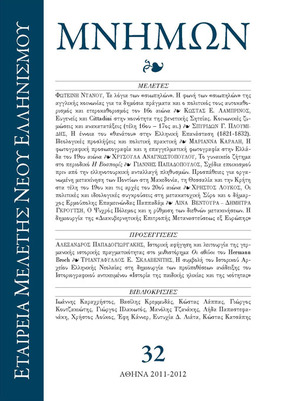Σύγχρονες και ιστορικές διαστάσεις της ανθρωπωνυμικής συμπεριφοράς στην Αλβανική κοινωνία
Part of : Μνήμων ; Vol.25, 2003, pages 111-145
Issue:
Pages:
111-145
Parallel Title:
Actual and Historical Dimensions of Anthroponymic Behavior within Albanian Society
Section Title:
Articles
Author:
Abstract:
This paper analyses a wide-spread phenomenon among Albanian migrants in Greece, namely the assumption of a new name and religious identity within bureaucratic and everyday life. This social practice was common especially during the first phase of the migration movement in the 1990s and is linked intrinsically to the inferior status of migrants within the dominant society and their desire to change this status. The article will elucidate social strategies of migrants who have been marginalized in a society dominated by «Greek» national symbols. It will address the impact of changing name and religious identity on the life of migrants in Greece as well as the relation of this practice to cultural processes of naming and identity deriving from the migrants' country of origin. The main concern of the article is to challenge the assumed congruence between «old» and «new» patterns of naming and to embed name changes in the context of past social strategies. In the context of the Greek national state, we will initially analyse why social integration both presupposes or is conditioned by ethnicreligious assimilation. In doing so, we will give a short anthropological introduction to the historical and social meaning of naming in local societies as well as in national ideologies. A comparison of Greek and Albanian national and local settings will comprise the first step of the attempt to record and understand the concrete migrant experience. The main part of the study will focus on empirical data collected in two Albanian communities (Muslim and Christian). Here we will approach the ernie concepts of name and collective affiliation as well as their connection to religious identities. This will be achieved through an analysis of demographic and genealogical data, traditions of name patterns and rituals of name-giving, as well as popular beliefs in the power of names. Names as diachronic symbols within Albanian culture will be shown to be significant both in the multiple ways migrants perceive names and patterns of identity and in the strategies they develop within a process of social marginalization.
Subject:
Subject (LC):




